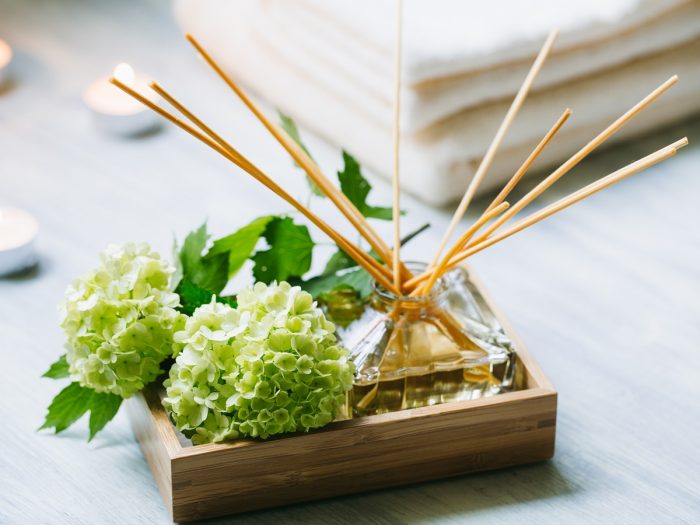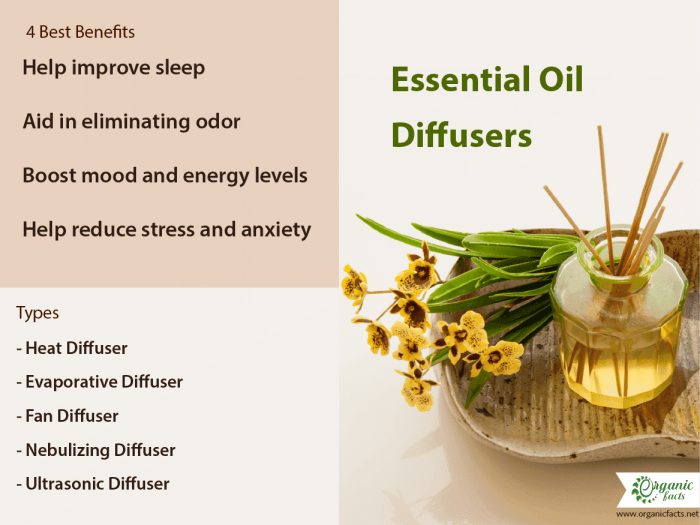Essential oil diffusers are excellent tools to get beneficial essential oils into the air, where their effects can be felt. They have long been used in aromatherapy treatments to cleanse the air and promote a soothing ambiance in the environment. Although they are usually used for either aesthetic or therapeutic purposes, they may also boast some amazing health benefits!
Some people use essential oils topically, others use them internally (although the direct consumption or inhaling of essential oils can be toxic). With essential oil diffusers, you get to control what oils are dispersed in the air, for how long, and in what concentration. For people who want to take a more active role in their own health, and prefer a natural, proven method with a few side effects, purchasing an essential oil diffuser could be an excellent choice.
Reasons to Use an Essential Oil Diffuser
Using an essential oil diffuser might allow you to access all the benefits of essential oils, unlike heating oils in candles or wax warmers. In fact, applying heat to essential oils denatures vital chemicals and compounds, it is essentially diffusion of the oils for scent, and not for beneficial aspects.
For this reason, you should always use a diffuser that doesn’t rely on heat to push out the scent. Heat diffusers that rely on heat are not as effective as fan diffusers, nebulizing diffusers, evaporative diffusers, and ultrasonic diffusers. Evaporative and ultrasonic diffusers deliver a consistent mist of essential oils to a space that can leave you feeling relaxed, uplifted, and confident.
Benefits of Essential Oil Diffuser
Let’s discuss some of the best benefits of essential oil diffusers below.

What do you do to feel calm? Photo Credit: Shutterstock
May Help Promote Good Sleep
Many essential oils may promote neurotransmitter activity in your brain, and might stimulate a release of the hormones, serotonin, and dopamine, leading to restful, uninterrupted sleep. Excellent sleep oils include bergamot, sandalwood, and lavender. [1] [2]
May Improve Respiratory Health
Inhaling essential oils may help improve inflammation in the respiratory tracts, boost immune health, and help eliminate colds and coughs. According to a study, the essential oil of thyme, clove, and cinnamon bark are effective for the respiratory tract pathogens. [3] [4]
May Help Eliminate Odor
Fragrances have a direct or indirect impact on the psychological and physiological condition of a human. Studies reveal that inhaling essential oils may have versatile psychophysiological properties that elevate a person’s mood or behavior. Lavender, peppermint, rosemary, jasmine, lemon, geranium, chamomile, and spearmint are the most aromatic plants that aid in the elimination of odor. [5]
May Elevate Mood
Essential oils may have the power to eliminate sadness and depression by brightening your mood. You can also set a romantic dinner date by simply turning on the diffuser and letting the air of romance spread everywhere. Lavender and bergamot may work wonders for the same. If you regularly feel fatigued or lacking energy, certain oils, such as grapefruit, cinnamon, lemon, and orange are great for giving you a critical boost to energy and mood. [6] [7]
May Reduce Stress & Anxiety
Many people diffuse essential oils to reduce anxiety and promote calmness of body and mind, particularly, oils like lavender, frankincense, neroli, and chamomile. [8]
May Repel Insect
Many bugs cannot stand the aroma of diffused essential oils, and it may actually prove to be fatal for them, making these oils great for preventing mosquitoes, gnats, and other pesky bugs from disturbing your space. Best insect-repellent oils include peppermint, lavender, cinnamon, geranium, and cedarwood. [9]
May Boost Immune System
Many essential oils have antibacterial and antiviral effects, which may help protect your immune system once they are inhaled. Immune-boosting oils might include eucalyptus, ginger, lemon, tea tree, peppermint, clove, and camphor. [10] [11]
May Control Appetite
Some essential oils are known for interacting with the limbic system (the emotional side of our brain) and turning off our desire to eat, which can help with weight loss. Grapefruit, lavender, orange, ylang-ylang, and patchouli oil are best for curbing appetite. [12] [13]
May Create a Healthy Environment
Airborne bacteria can be very dangerous, but if you diffuse the right oils, you can create an antimicrobial, antioxidant, anti-inflammatory, and antibacterial environment at home that keeps you and your family healthy. The best oils for this are tea tree, lemon, cinnamon, and oregano. [14] [15]

You can set a romantic dinner date by simply turning on the diffuser and letting the air of romance spread everywhere.
May Boost Memory & Concentration
You may also be able to improve memory, cognitive function, and focus on diffusing oils like rosemary, basil, spearmint, lemongrass, and tangerine. [16]
May Offer Pain Relief
Another use of an essential oil diffuser is a pain reliever. It might give relief from headaches, sinus, joint pain, or pain arising from overworked muscles. [17]
May Be Cost Saving
Essential oil diffusers are cost-effective and impart its amazing health benefits thereby reducing your need to inhale the aroma of coffee beans. Not only this, but the diffusers also help in lowering your electricity bills and reducing your number of monthly or yearly visits to the doctor. [18]
How Do Essential Oil Diffusers Work?
A little ceramic disc runs the mechanism of making ultrasonic diffusers work. When you load the tank with water, add few drops of essential oil and turn it on. The disc starts vibrating and creates ultrasonic waves that fragment the oil into minute particles. Then, the diffuser releases a light mist of essential oil with water into the air, helping you inhale the pure scent.
Different Types of Essential Oil Diffusers
Depending on what type of essential oil diffuser you choose, they might work in different ways. As mentioned earlier, there are five main types of essential oil diffusers, each with their own pros and cons, depending on how and where you wish to use them, as well as the effects you hope to achieve.
- Heat Diffuser – A heat diffuser heats the essential oil, causing it to evaporate, releasing the aroma of the oil into the air. While this gives a pleasant smell to the house, this may not be the ideal choice if you want therapeutic effects. Many of the chemicals and compounds in a heat diffuser will be denatured and neutralized when heated, so there is very little health benefit delivered.
- Fan Diffuser – A fan diffuser doesn’t rely on heat, but rather moves air across a wick or absorbent surface that contains the essential oil. This moving air will carry breathable molecules into the environment, so therapeutic effects can be transferred, but the area of effect will be relatively small. This is good for a bathroom, a car, or a small bedroom, but in larger spaces, they are less effective.
- Evaporative Diffuser – In a similar way, evaporative diffusers allow the essential oil to be exposed to the air, and thus slowly evaporate. The size of the molecules can be inhaled for therapeutic effects, but again, this will only work in a relatively small or confined space.
- Nebulizing Diffuser – Widely considered the best option for essential oil diffusers, nebulizing diffusers use cold, pressurized air to force essential oil molecules into an atomizer. This breaks the molecules into extremely fine particles that are pumped out into the air, where they hang suspended for hours, rather than settling to the floor as with other diffusers. These ultra-fine particles can be inhaled, will cleanse the room of other toxic particles, or land on your body to be absorbed by the skin. These diffusers tend to be more expensive, but are also praised as the most effective.
- Ultrasonic Diffuser – This type of essential oil diffuser creates small vibrations within a combination of water and essential oil, which causes a fine mist to be released into the air, where it can be inhaled and improve the aroma of a room. While the area of coverage of ultrasonic diffusers can be relatively large, by combining the essential oils with water, some of the therapeutic benefits are compromised. This is generally considered the second-best option for a diffuser after the nebulizing diffuser.
Best Essential Oils for Use in a Diffuser
There are many essential oils that can be used in a diffuser for various benefits and greater effects! These include the use of the following:
- Peppermint essential oil
- Lemongrass essential oil
- Lavender essential oil
- Frankincense essential oil
- Cinnamon essential oil
- Wild Orange essential oil
- Lemon essential oil
- Ginger essential oil
- Citronella essential oil
- Bergamot essential oil
- Sandalwood essential oil
